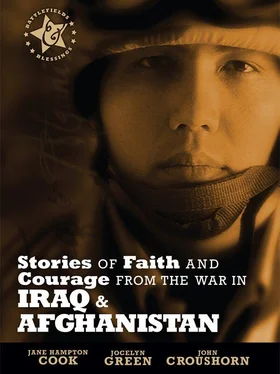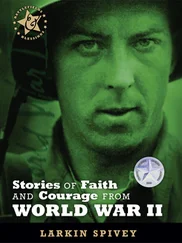After the festivities, Head did what many service members did while visiting Ali base tour two of Iraq’s most historical sites: The Ziggurat and the House of Abraham.
The Ali base is located on the site of the ancient Sumerian city of Ur, the one mentioned in the Biblical account of Abraham. Over 4,000 years earlier King Shulgi ordered the construction of the brick Ziggurat (similar to the Egyptian pyramids).
While touring Head saw the oldest example of a free-standing arch in the known world; the oldest example of indoor plumbing; and script written into bricks which were placed more than two thousand years before the Romans ever existed. The House of Abraham was the last stop on their tour. Although no one can verify that it’s actually Abraham’s house, the Iraqis have long made the claim.
“It was incredible to think about walking in the same area (even if it is not exactly right, it has to be close) where Abraham walked. Like Jerusalem, all of the world’s greatest religions (Judaism, Christianity, and Islam) can trace their roots to this one place,” Head wrote, noting the Ziggurat is also supposedly perfectly aligned with the four corners pointing in the cardinal directions.
Touring these sites was a welcome break from Iraq’s severities, such as riding in full armor on a bus through Baghdad or experiencing the worst airplane ride ever. The sites were reminders of humanity’s roots, particularly God’s promise to Abraham to make his descendents more numerous than the stars.
One condition shared by the tourists with father Abraham was the heat. Head used his trademark humor to make the connection.
“The whole time we were walking around (in the 120 degree heat), all I could think of was that when God told Abraham to leave here and go to the place that I will show you, Abraham must have been thrilled!” Head observed with a grin.
Prayer:
Thank you for historical markers that show the greatness of the past and the promise you have made for our future.
“He also said to him, ‘I am the LORD, who brought you out of Ur of the Chaldeans to give you this land to take possession of it.’” (Genesis 15:7)
April 8
MUDDY SEASON
Lt. Col. Greg Rosenmerkel, United States Air Force
The Iraq rainy season isn’t best defined by rainfall inches; it’s unofficially measured by how long the mud ponds last.
“We’re right in the middle of the rainy season,” Air Force Lieutenant Colonel Greg Rosenmerkel explained in a January 2007 email to his friends after only a few weeks into his six-month deployment. “From what I’ve seen so far, that statement may be a bit misleading. While it has rained four to five days this month, up to 1.5 inches in a day, it’s the lingering ponds that keep one thinking it’s a ‘season.’”
Rosenmerkel commanded an Air Force team whose mission was to oversee a number of engineering projects at the Logistics Support Area Anaconda, collocated with Balad Air Base, about thirty miles from Baghdad. Rosenmerkel’s team provided capabilities the Army needed but couldn’t provide from within.
“The base is flat. Storm sewer inlets are few and far between. The soil is impermeable silt clay, and the Iraqi irrigation canals surrounding us are higher elevation. Even in wartime, we can’t make water flow uphill. Mud is everywhere,” Rosenmerkel observed.
“All the mud really just adds to the inconvenience. We’re obviously in uniform all the time, so when you gotta go in the middle of the night, you get dressed, schlep through the mud to the porta-potty, and try to get back in bed without bringing the mud with you,” he explained.
Mud clings to everything. It’s consistency is not normal mud either it’s slippery. It could be described as somewhere between a McDonald’s chocolate shake and baby poop. It’s got a remarkable ability to track one hundred feet down a hallway, then when it dries it just turns to dust and finds its way into your coffee cup.
Boot scrapers dot all doorsteps. These boot brushes are everywhere, but they really just serve to remove the big rocks and fling mud higher on your pant leg or your buddy’s.
The mud in Iraq is hard to get off because it’s fine and silt-like. Understanding Middle East mud sheds new light on the Biblical phrase “shaking the dust off your feet” a response to an insult or inhospitable gesture. Rosenmerkel’s observation literally shows how hard it can be to “shake the dust from your feet.”
Just as it’s sometimes necessary to clean mud off your feet, so it’s also important to let go of life’s insults. Like mud, it’s better to view them an inconvenience.
Prayer:
God, enable me to let go of the insults that sometimes come my way. Keep them from becoming grudges. Instead, help me to have the persistence to wash them off as mud from my feet.
“If anyone will not welcome you or listen to your words, shake the dust off your feet when you leave that home or town.” (Matthew 10:14)
April 9
GRAVEL JOB CONDITIONS
Lt. Col. Greg Rosenmerkel, United States Air Force
To build roads, one needs asphalt. To make asphalt, one needs gravel. Sometimes getting gravel for engineering projects at Anaconda-Balad-Balad Air Base seemed as primitive as the cartoon celebrity, Fred Flinstone, operating a bronco crane at Bedrock’s Slate Rock and Gravel Company.
After eighteen years in the Air Force, Lt. Col. Greg Rosenmerkel was used to having some discretionary funding authority. The United States military process in Iraq was very different. No matter your rank, all expenditures went all the way to the “corps” for approval.
“One of our challenges has been getting construction work estimated, bid, and completed in an incredibly volatile market. In the past few weeks we’ve seen costs for gravel range between $200 and $400 per ton. For those of you that don’t buy much bulk rock that’s about a factor of ×10+ off market rates in the states, which makes it hard to come close on estimates when it takes forty-five days for work to get funded,” Rosenmerkel emailed his friends.
Gravel woes went beyond paperwork pushing and market drivers. They were gravely serious.
“The story goes that this week the quarry operator was taken hostage and the family had to pay a $500,000 ransom,” Rosenmerkel wrote, adding the driver was beaten or worse. “Further, a passage fee must be paid to the village sheiks to use the roads, so in an industry where profit margins are generally around 3 percent, there ain’t much left.”
Getting gravel delivered also created security problems, which slowed the process. Because a truckload of gravel is a great place to hide a bomb, and the U.S. military try to give work to local contractors and suppliers, and getting material on base is quite an operation. First, the local contractors line up at the gate, often as far as the eye can see. One by one, they come in and dump their load for dirty ops where the material is screened. Once that’s done, it’s loaded into other trucks that are permitted on base as clean ops. Camping overnight in a line is something Americans do for concert tickets, not paychecks. Not so in Iraq. If their gravel truck didn’t go through dirty ops early enough to ensure they would be out by 1700 hours, the Iraqi drivers would line outside the gate and camp overnight.
“It’s a good reminder of the blessing of having regular work hours as most Americans do,” Rosenmerkel concluded.
It’s also a good reminder to pray for those in need.
Prayer:
Thank you for reminding me of the blessings you have given America. I pray that the Iraqis will soon overcome the challenges they face just to get a paycheck.
Читать дальше












